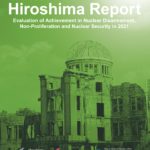(8) FMCT
(8) FMCT
A) Efforts toward commencing negotiations on an FMCT
In the “Decision 2: Principles and Objectives for Nuclear Non-Proliferation and Disarmament” adopted at the 1995 NPT Review and Extension Conference, participating countries agreed on “[t]he immediate commencement and early conclusion of negotiations on a nondiscriminatory and universally applicable convention banning the production of fissile material for nuclear weapons or other nuclear explosive devices.” Western countries, including Japan, as well as the Non-Proliferation and Disarmament Initiative (NPDI), have repeatedly called for its early realization.200 However, substantive negotiations have not yet commenced. The 2019 session of the CD again ended without adopting a program of work that included the establishment of an Ad Hoc Committee on a FMCT negotiation, due to Pakistan’s strong objection, as was the case in previous years. Pakistan has insisted that not just newly produced material but also existing stockpiles of such materials should be subject to the scope of negotiations on a treaty. China expresses support for the commencement of negotiations on an FMCT prohibiting the future production of fissile material for nuclear weapons, but it does so less actively than the other NWS. Israel has a similar posture.
Concerned states have pursued various measures for commencing FMCT negotiations at the CD. Among them, the 2016 UN General Assembly decided to establish a High-Level FMCT Expert Preparatory Group, “to consider and make recommendations on substantial elements of a future non-discriminatory, multilateral and internationally and effectively verifiable treaty banning the production of fissile material for nuclear weapons or other nuclear explosive devices, on the basis of CD/1299 and the mandate contained therein.” The Group, consisting of experts from 25 countries, convened two-week meetings in 2017 and 2018, respectively, and adopted a final report in June 2018.201 The report contains four sub-sections covering treaty scope, definitions, verification, legal and institutional arrangements, and other elements (such as a treaty’s preamble, and transparency and confidence building measures), and provides a list of possible treaty elements and some of the considerations that negotiators may wish to take into account.
B) Moratoria on production of fissile material for nuclear weapons
Among nuclear-armed states, China, India, Israel, Pakistan and North Korea have not declared a moratorium on the production of fissile material for nuclear weapons. India, Pakistan and North Korea are highly likely to continue producing fissile material for nuclear weapons and expanding production capabilities.202 The situation in Israel regarding this issue is unclear.
In 2018, North Korea offered to destroy nuclear-related facilities in Yongbyon in exchange for corresponding measures by the United States, but it is considered that the North enriches uranium at additional facilities in other locations. China is widely considered not to be producing fissile material for nuclear weapons currently.162 At the 2019 NPT PrepCom, the NPDI “call[ed] upon [NWS] that have not already done so to declare and implement a moratorium on fissile material production.”203
None of the nuclear-armed states have declared the amount of fissile material for nuclear weapons which they possess (except for the U.S. declassifying the amount of its past production of HEU and plutonium). Estimates by research institutes are summarized in Chapter 3 of this Report.
200 NPT/CONF.2020/PC.III/WP.42, April 29, 2019。
201 A/73/159, July 13, 2018. See also “High Level Fissile Material Cut-Off Treaty (FMCT) Expert Preparatory Group,” The United Nations Office at Geneva, https://unog.ch/80256EE600585943/(httpPages)/B8A3B48A3FB7185EC1257B280045DBE3?OpenDocument; Paul Meyer, “UN High-level Fissile Material Cut-Off Treaty Expert Preparatory Group Report: Little Prospect for Progress,” IPFM Blog, September 26, 2018, http://fissilematerials.org/blog/2018/09/un_high-level_fissile_mat.html. Participating countries are Algeria, Argentina, Australia, Brazil, Canada, China, Colombia, Egypt, Estonia, France, Germany, India, Indonesia, Japan, South Korea, Mexico, Morocco, the Netherlands, Poland, Russia, Senegal, South Africa, Sweden, the United Kingdom and the United States. Pakistan refused to participate in the Group. At the Informal Consultative Meeting by the Chairperson of the High-level FMCT Expert Preparatory Group in March 2017, Pakistan argued that it could not join any discussion, pre-negotiation, negotiation or preparatory work on the basis of the Shannon Mandate: that is, considering a treaty which only prohibits future production and leaves the existing stocks untouched.
202 See, for instance, Hui Zhang, “China’s Fissile Material Production and Stockpile,” Research Report, International Panel on Fissile Materials, No. 17 (2017); Hui Zhang, “Why China Stopped Making Fissile Material for Nukes,” Bulletin of the Atomic Scientists, March 15, 2018, https://thebulletin.org/2018/03/why-chinastopped-making-fissile-material-for-nukes/.
203 NPT/CONF.2020/PC.III/WP45, April 29, 2019.





